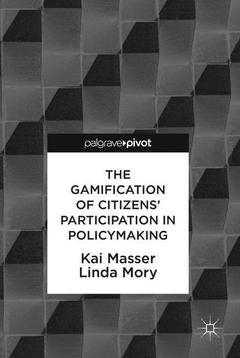The Gamification of Citizens' Participation in Policymaking , 1st ed. 2018
Auteurs : Masser Kai, Mory Linda

Kai Masser is Senior Researcher at the German Research Institute for Public Administration (GRIP) and a Lecturer at the German University of Administrative Sciences, Speyer, Germany.
Linda Mory is a Senior Project Consultant at a global IT company and a Lecturer at the German University of Administrative Sciences, Speyer, Germany.
Examines the use of game elements to encourage citizens to participate in political decision-making and the planning of large-scale public sector projects
Argues that success in policy making requires not only investment and belief in a project, but also fun
Engages with a detailed case study, examining the relationship between representative democracy and citizen participation from the perspective of direct democratic instruments in Germany
Date de parution : 04-2018
Ouvrage de 140 p.
14.8x21 cm
Disponible chez l'éditeur (délai d'approvisionnement : 15 jours).
Prix indicatif 52,74 €
Ajouter au panierThèmes de The Gamification of Citizens' Participation in Policymaking :
Mots-clés :
Game elements; Player types; competition; points; badges; ancient Rome; ancient Athens; Democracy; Volonté Générale; Evolution theory; Olympic Games; Direct democracy vs representative democracy; majority decision; deliberation; citizen's participation as tokenism; Arnstein's Ladder; Deliberation; (dis)trust in politics; civic virtues; utilitarianism; german politics



